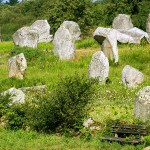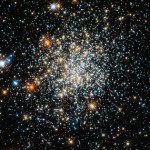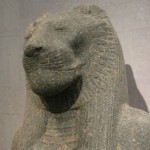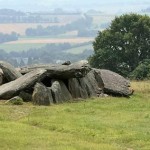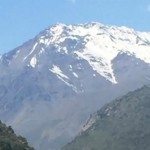Let us celebrate the mystery of Lammas,
the season of the Summer Queen and Sacrificial King.
What most we love we must give back again,
the dance of life may spiral on and on.
From death comes forth new life, and thus rebirth;
from joy to grief and sorrow, and back again to mirth.

We humans seem to be hard-wired for reciprocity. When we receive, we also feel the need to give. As children we are taught to say, ‘Thank you,’ when we receive a gift or when someone does something for us. This gives pleasure to the giver and encourages the giver to give again. Our ancestors saw the world as being controlled by the Gods. If the sun shone, the rain fell, the land was fertile, and the grain harvest was good, then there would be food to store through the winter, food that would make the difference between life and death. If the Gods provide, then people want to thank them, so in all our different ancestral cultures we created rites and ceremonies, actions and words, to honor the Gods who kept us fed and to thank them so they would continue to do so.
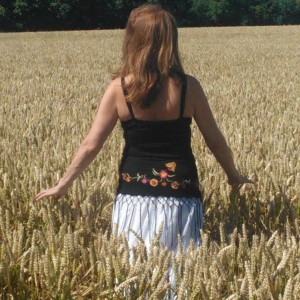
It is also a natural instinct to want to offer something more than thanks alone. Our ancestors offered all manner of sacrifices, depending on what was acceptable to that time and culture. It could be prisoners of war, first-born children, animals, birds, weapons, precious jewelry, fruit, or flowers. We had been given something on the material plane, so our instinct was to offer something material in return. Nowadays, most of us do not believe that our Gods spend their time trying to fix the weather pattern for us. We tend to see Nature as an interconnecting and interacting ecosystem. We may see Nature as an entity that is alive and conscious, but we do not necessarily believe that specific parts of Nature are being arranged for our benefit by our personal tribal deity. We do know instinctively, however, even if we do not consciously articulate the thought, that we are dependent on Nature.
We are an organism within Nature’s greater whole and our actions have effects, albeit small ones, on the greater system. Each of us individually has only a small effect, but collectively our species is now one of the major forces within the ecosystem, one whose actions impact on all the rest. As one of the most conscious species on our planet, and one with the greatest power to change what we do and how we live, we have a unique responsibility for assisting the ecosystem to maintain itself and to remain healthy and in balance.
How does this link to Lammas?
Lammas is the festival when we celebrate the culmination of the material cycle of the year. Nature has renewed at spring, matured at Beltane and Midsummer. Now we enter the downward part of the cycle, where growth shifts to decay and we harvest Nature before it declines and grain and fruit begin to die off for winter. It is a natural time to thank Nature for what she has given us. How can we do this? Does Nature really care whether we cast a circle and invoke the quarters, whether we invoke the Corn King as Lord of the Harvest and cut him down in symbolic sacrifice? I would think not. Does something within us care? For many of us who are Pagans, the answer is, ’Yes.’
These symbolic rites and actions provide powerful messages about what we as human beings find important. They are reminders that we are part of Nature and not ‘apart from’ Nature. They remind us that we need to be aware that our human existence is dependent on the ecosystem of the planet. They encourage us to be grateful to be part of that ecosystem and to be grateful that it maintains our bodies and consciousness and allows us to live, breathe, and experience the wonder of life in incarnation.
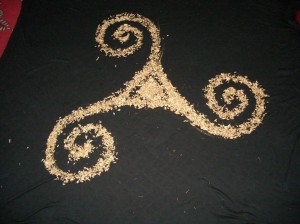
To be mindful of ourselves as part of Nature is important ant it is all too easy to forget. It is easy to become unmindful and to live in a mechanistic way that is out of touch with reality. When we stop off after work to buy groceries, we enter the strange neon-lit world of the supermarket, where food is processed, dyed, chopped, designed, irradiated, filled with preservative chemicals, transported thousands of miles, wrapped, tinned, frozen – a thousand and one processes to do something as simple as allowing us to eat. It is much harder to be enthusiastic about celebrating a freezer full of frozen food, compared with a field of golden wheat. And because it is harder we have to make more effort to remind ourselves to celebrate Lammas and what it means, because we are just as dependent as were our ancestors on the ecosystem and what it can provide for us. We can manipulate our food by all the different processes available to us, we can learn to grow things in better ways, but we need sun, water, and soil, just as our ancestors did, if we are to grow the food we need.
‘Nor do I demand sacrifice’
Food is not the only material thing that our planet provides for us. We have shelter, heating, lighting – all material comforts that draw on the planet and what it can provide. Lammas can be a celebration therefore of all that we have been given and a time to honor this with sacrifice. Sacrifice is a magickal act of energy exchange; a way of reminding ourselves of the interacting and reciprocal energies that is the basis of our universe. For Wiccans, this can be a form of polarity. In Wicca, the Goddess tells us, ‘Nor do I demand sacrifice.’ But although our Gods do not demand sacrifice for themselves, it does not mean that it is not worthwhile to sacrifice voluntarily in exchange for what we have been given.
We pour libations to the Earth in ritual, but what else can we give back out of what has been given to us? Food is a major theme of Lammas. We could donate to a food bank, give money to a charity that promotes sustainable agriculture, or we could give of our time and energy by starting to grow some food – even if this is just some pots of herbs on a kitchen shelf. The exchange of energy is an underlying principle of magick; another is as above so below. We honor the invisible realm of the Gods and in the material realm we sacrifice something by giving to others or to the planet. Thus is the sacrifice of Lammas made.

